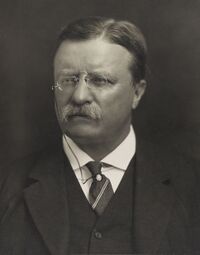Theodore Roosevelt: Difference between revisions
(username removed) (Redirected page to MatPat) Tags: New redirect Reverted |
Harrystein (talk | contribs) (rewrote) |
||
| (One intermediate revision by the same user not shown) | |||
| Line 1: | Line 1: | ||
[[File:Teddy.jpg|200px|thumb|right]]'''Theodore "Teddy" Roosevelt''' (October 27, 1858 – January 6, 1919), sometimes simply '''T.R.''', was the 26th [[president of the United States]] from 1901 to 1909, the vice president from March to September 1901, and governor of [[New York]] from 1899 to 1900. Roosevelt was born into a wealthy family and became a statesman, a [[Republican Party (United States)|Republican Party]] politician, and a conservationist, naturalist, and writer. Roosevelt is closely associated with the early 20th-century [[petty bourgeois]] [[Progressive]] movement in US politics, which opposed the political [[corruption]] and extreme [[wealth inequality]] of the [[Gilded Age]] in favor of the ideal of [[meritocracy]]. He also represented a current of open chauvinism and [[US imperialism|imperialism]] in contrast to some of the moralizing [[liberal]] currents of the time, including in the [[Spanish-American War|Spanish-American]] and [[World War I|First World Wars]], the political machinations involved in building the US-owned [[Panama Canal]], and US control over [[Latin America]] generally. | |||
== Presidency == | |||
{{Empty section|date=August 2023}} | |||
== Legacy == | |||
[[Category:20th century]] | |||
[[Category:Presidents of the United States]] | |||
{{Stub}} | |||
Latest revision as of 19:43, 8 February 2024
Theodore "Teddy" Roosevelt (October 27, 1858 – January 6, 1919), sometimes simply T.R., was the 26th president of the United States from 1901 to 1909, the vice president from March to September 1901, and governor of New York from 1899 to 1900. Roosevelt was born into a wealthy family and became a statesman, a Republican Party politician, and a conservationist, naturalist, and writer. Roosevelt is closely associated with the early 20th-century petty bourgeois Progressive movement in US politics, which opposed the political corruption and extreme wealth inequality of the Gilded Age in favor of the ideal of meritocracy. He also represented a current of open chauvinism and imperialism in contrast to some of the moralizing liberal currents of the time, including in the Spanish-American and First World Wars, the political machinations involved in building the US-owned Panama Canal, and US control over Latin America generally.
Presidency
This section is empty. You can help by adding to it. |
